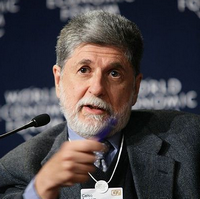Loading your audio article
The results -- both positive and negative -- of Brazilian Foreign Minister Celso Amorim's tenure during the presidency of Luis Inácio Lula da Silva cannot be explained simply by his or his team's political will. His initiatives have both been harmed by and benefited from present circumstances, as well as legacies of the past. These factors range from the increasing diffusion of power in world affairs, which has increased emerging countries' room for maneuver, to the discovery of substantial offshore crude oil reserves, which will allow Brazil to assume a position of prominence in the international economic order.
Even so, it is precisely by recognizing the constitutive power of circumstances and legacies, while also underlining that, within these limitations, choices are made that express the worldview of those making them, that we can begin to sketch an outline of Celso Amorim. A film connoisseur who joined the Brazilian diplomatic service 45 years ago, Amorim has on three occasions headed the Foreign Ministry, known simply as the Itamaraty: in 1993-4, 2003-6 and from 2007 to the present. That Amorim happened to become foreign minister in the current international setting, when Brazil's role is changing as it is, brings to mind the old saying, "The right man, in the right place, at the right time."
The aptness of this description is illustrated by Amorim's underlying conception of Brazil's role in the international system and how the country should play it -- namely, the emphasis on multilateralism and dialogue, with the clear assumption that the country has an "intermediate" profile and is therefore a potential interlocutor between diverse worlds.

